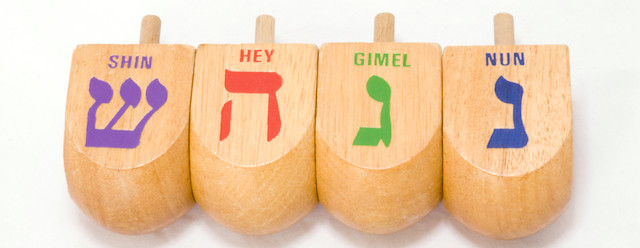The Jewish calendar is a lunar calendar whereas the calendar used by the rest of the U.S. is the Gregorian calendar, based on the sun. So, sometimes by coincidence, Jewish and non-Jewish holidays coincide. That doesn't mean that they are related in purpose or origin, it's just a calendar coincidence.
I am quoting excerpts here from a very well written article from a religious Jewish newsletter.
Chanukah was established to commemorate the very opposite of cultural assimilation. It dates back nearly 22 centuries, to the successful Jewish revolt against Antiochus IV, one of the line of Syrian-Greek monarchs who ruled the northern branch of Alexander the Great's collapsed empire. Alexander had been respectful of the Jews' monotheistic religion, but Antiochus was determined to impose Hellenism, with its pagan gods and its cult of the body, throughout his domains. When he met resistance in Judea, he made Judaism illegal.
Sabbath observance, circumcision, and the study of Torah were banned on pain of death. A statue of Zeus was installed in the Temple in Jerusalem, and swine were sacrificed before it. Prostitutes were brought in to have relations upon the holy altar itself. Some Jews embraced the new order and willingly abandoned the G-d and faith of their ancestors. Those who wouldn't were cruelly punished. Ancient writings tell the story of Hannah and her seven sons, who were captured by Antiochus's troops and commanded to bow to an idol. One by one, each boy refused -- and was tortured to death before his mother's eyes.
The fight to reclaim Jewish religious autonomy began in 167 BC. An elderly priest named Mattathias refused a Syrian order to sacrifice to an idol. When an apostate Jew stepped forward to comply, Mattathias killed the man and tore down the altar. Then he and his five sons took to the hills and launched a guerrilla war against the armies of the empire.
When Mattathias died, his third son, Judah Maccabee, took command. He and his band of fighters were impossibly outnumbered, yet they won one miraculous victory after another. In 164 BC, they recaptured the Temple, which they cleansed and purified and rededicated to God. On the 25th day of the Jewish month of Kislev, the menorah -- the candelabra symbolizing the divine presence -- was rekindled. For eight days, throngs of Jews celebrated the Temple's restoration. "All the people prostrated themselves," records the book of Maccabees, "worshipping and praising Heaven that their cause had prospered." In truth, though, their cause hadn't prospered -- not yet. The fighting went on for years. It was not until 142 BC that the Jews regained control of their land.
The holiday lasts for 8 days because there was only a one-day supply of consecrated oil left unsullied by the Romans in the Temple. It was a 4 day journey each way to the next town where consecrated oil might be found. So G-d performed a miracle and made the one-day supply of oil last until a new supply could reach the Temple.
As this article so eloquently explains, "...Chanukah used to be regarded as a minor half-holiday, cheerful but low-key. It has become something bigger and brighter in response to Christmas, which transforms each December into a brilliant winter festival of parties, decorations, and music. Attracted by the joy of the season, not wanting their children to feel left out of all the merriment and gift-giving, American Jews in the 20th century began to make much more of Chanukah than their grandparents ever had."
So Chanukah is NOT the Jewish version of Christmas; its origins are quite different. It has no Sabbath-like restrictions or dietary restrictions. You have to kindle the appropriate number of candles or oil wicks in your menorah, one additional one each nightt. It is traditional to serve potato pancakes (Ashkenazic custom) or sufganiyot (jelly filled delicious donuts - Sephardic custom), both of which incorporate OIL in their preparation and thus harken back to the miracle of the oil. It is traditional to spin a top called a dreidel which has the Hebrew letters nun, gimmel, hey, shin ― the first letters of "A Great Miracle Happened There" in Hebrew. 